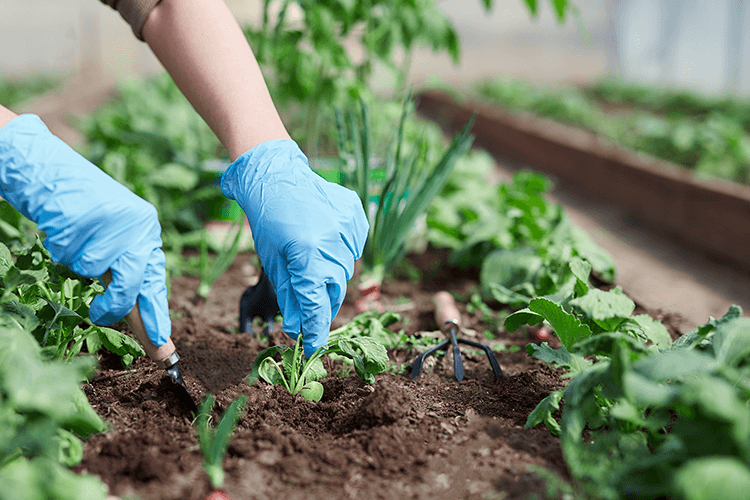Fertilizer
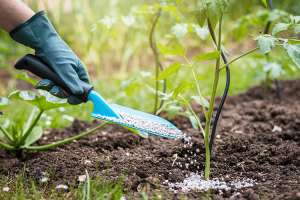 Gardeners often use fertilizers to help plants grow. Whether for a small garden of flowers and plants, or a large farm with thousands of acres of crops, fertilizers play an important role in providing plants the nutrients they need to grow in different soil and weather conditions.
Gardeners often use fertilizers to help plants grow. Whether for a small garden of flowers and plants, or a large farm with thousands of acres of crops, fertilizers play an important role in providing plants the nutrients they need to grow in different soil and weather conditions.
Most chemical fertilizers are made by the reaction of an acid with an alkali. Packaged fertilizers also often contain three macronutrients: nitrogen, phosphorous and potassium. Ammonium nitrate, a good source of nitrogen and ammonium for plants, is also an important ingredient in the production of many high quality, effective fertilizers.
Pesticides & Herbicides
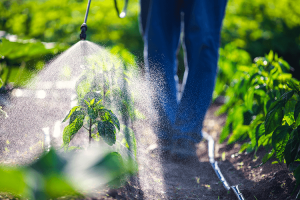
Pesticides and herbicides help gardeners manage insects, diseases, and invasive weeds to protect their plants. The term pesticides cover a range of chemical compounds used to help prevent the spread of disease and protect plants from pesky pests.
Acetic acid is a clear, colorless, organic liquid with a pungent odor similar to household vinegar. In concentrations of around 10 to 20 percent, acetic acid can be used as a weed killer on gardens and lawns. When used as an herbicide, the acetic acid can kill weeds that have emerged from the soil, but does not affect the roots of the weed, so they can regrow.
Indoor Vertical Gardening
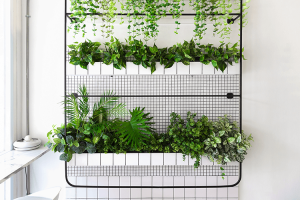 Apartment dwellers and those without a backyard can also flex their green thumb by building an indoor vertical garden. With just a few tools—PVC pipes, fertilizer, artificial light, and water—you can turn a corner of your home into a garden oasis. Build a plant tower using PVC pipes and fill it with gardening pots. Invest in artificial lighting (made with the help of hydrogen fluoride) to replicate the sun’s rays and you’ll be on your way to growing your own fruits and vegetables indoors.
Apartment dwellers and those without a backyard can also flex their green thumb by building an indoor vertical garden. With just a few tools—PVC pipes, fertilizer, artificial light, and water—you can turn a corner of your home into a garden oasis. Build a plant tower using PVC pipes and fill it with gardening pots. Invest in artificial lighting (made with the help of hydrogen fluoride) to replicate the sun’s rays and you’ll be on your way to growing your own fruits and vegetables indoors.
Water
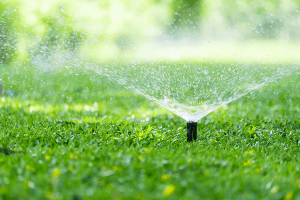 Water is crucial for most plants to grow and thrive, delivering vital nutrients and minerals. Products and technologies made possible by chemistry help enable water conservation, sanitation, reuse and transformation of contaminated water into clean water that can be used to water your garden. Antimicrobial chemicals can be used to treat water so it can be reused safely for many purposes, such as crop irrigation.
Water is crucial for most plants to grow and thrive, delivering vital nutrients and minerals. Products and technologies made possible by chemistry help enable water conservation, sanitation, reuse and transformation of contaminated water into clean water that can be used to water your garden. Antimicrobial chemicals can be used to treat water so it can be reused safely for many purposes, such as crop irrigation.
Gardening Tools
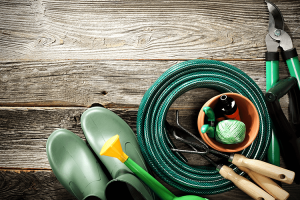 Chemistry is everywhere–from the fabric of the gloves you wear to the hose you use to water your plants. Here are just a few ways chemistry plays a role in the tools that help you grow your garden.
Chemistry is everywhere–from the fabric of the gloves you wear to the hose you use to water your plants. Here are just a few ways chemistry plays a role in the tools that help you grow your garden.
- When combined with various colorants, additives or other plastics, polystyrene is used to make a variety of products including gardening pots, as well as spades, hoes and other gardening tools.
- Because high phthalates help make flexible PVC perform well in changing weather conditions – maintaining flexibility in cold conditions and resisting degradation in high temperatures – they are found in many outside products, including garden hoses and waterproof footwear such as rain boots. They also can help make coated textiles used to make clothing like gardening gloves more durable and weather resistant.
- Wooden raised garden beds can be a good way to help protect plants for pests. Applying a polyurethane finish to your garden bed can help protect the wood from the outdoor elements like moisture and the sun’s rays.

